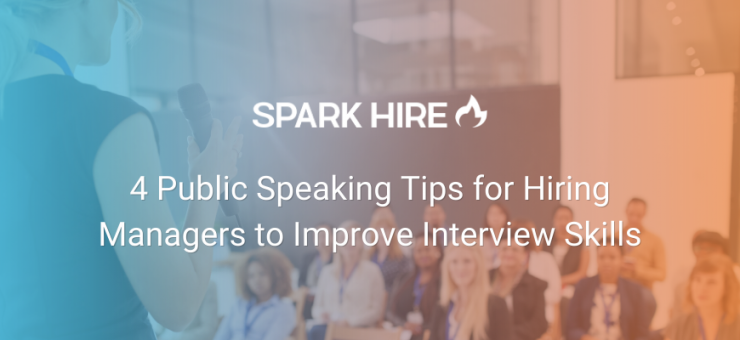Preparing for a job interview requires research, practice, and careful consideration. Job candidates must present their qualifications in the best possible light and use their public speaking skills to explain why they’d be a good fit for the role.
As a hiring manager or interviewer, you might not undergo this same level of preparation in your hiring process. However, sharpening your public speaking skills before your next round of interviews can actually bring plenty of benefits. When you communicate effectively about the role and its expectations, you’ll help your company bring more qualified candidates on board.
So, what public speaking skills should you focus on as a hiring manager? From asking the right questions to practicing your pitch, we’re going to cover these four tips:
- Know your hiring pool.
- Ask the right questions.
- Perfect your spiel.
- Host practice interviews.
Practicing these communication strategies ahead of your next hiring cycle ensures you’re just as prepared as the candidates who walk through the door for an interview. You’ll offer a better experience for prospective new employees and create a more intentional hiring process.
1. Know your hiring pool
A successful hiring process begins with researching your applicant pool. Study your target hiring audience using research tools like LinkedIn and other online job boards. Think carefully about the role you’re looking to fill and define the characteristics that a strong candidate would offer.
For example, if you’re looking for an experienced professional with two to four years in the industry under their belt, you probably shouldn’t reach out to recent college graduates.
Also, adjust your hiring practices based on the generation you’re looking to bring on board. Understanding the demographics of your target audience can help you think of the right questions to ask or aspects of the role to highlight. For example, if your target audience is millennials, you might use recruiting techniques like emphasizing your company’s culture or explaining your opportunities for growth, as these are both priorities for millennial candidates.
Learning more about your hiring pool before starting the interview process can help you speak about your role in a way that resonates with potential candidates.
2. Ask the right questions
Careful planning is key to a productive interviewing cycle, and that means planning the right interview questions.
Your interview questions will comprise the majority of your conversations with candidates. They’re your opportunity to get to know applicants and figure out who’s the right fit for the job.
Your questions should be well-thought-out and revealing. Here are a few examples of useful questions to ask:
- Why are you seeking a new job?
- What drew you to our open role?
- Do you have an example of a time when you demonstrated leadership skills in your previous role?
- What are your passions outside of work?
- Where do you see yourself in five years?
- Do you have any questions for me?
These questions will provide insight into whether the candidate would work well in the open role and whether they see themselves in the position long-term.
Applicants’ answers to the last question in the list can also be very revealing. Their responses will let you know how prepared they are for the interview and if they’ve thoughtfully considered the role.
3. Perfect your spiel
As you interview your candidates, remember that you’re not just assessing whether they’d be a good fit for your company—they also must determine whether your business is the right place for them.
Your “spiel” is the rundown you give to candidates about what it’s actually like to work for your organization. You can give a quick verbal overview of the position, but if you have the time, you can also prepare a short presentation with a few slides to support your rundown.
Whatever format you choose, let candidates know the following details:
-
- Role expectations and responsibilities. What are the day-to-day responsibilities of the role? What does a typical day look like?
- Work expectations. How many hours each day and days per week are candidates expected to work? Will candidates be in the office full time or do you offer hybrid or remote work opportunities? Do you expect a lot of late-night work or weekend work?
- Salary and benefits. What is the salary range for the role? What additional benefits do you offer, such as health insurance, paid time off, and 401k matching?
- Company culture. Does your company offer social events for employees? What are your company values?
- Success metrics for the role. How is success measured? How often will employees be evaluated? How does the position fit into your company’s overall business strategy?
If you choose to prepare a presentation for candidates, consider including photos or a short video with testimonials from your current employees talking about what it’s like to work for your company. This can provide more context for prospective employees and introduce them to their potential new coworkers.
4. Host practice interviews
Carrying out a mock interview is an often-used technique for job candidates to help them practice their talking points. But you can also use this technique as an interviewer to allow yourself to practice your public speaking skills before the recruiting season begins.
Ask a colleague if they wouldn’t mind hosting a mock interview with you. Run through your interview questions and your spiel and assess whether your questions are in the right order or whether your rundown is missing any key points.
Have your co-worker provide feedback on your interview process as well, noting any word choice issues or aspects of the role that they think are important to emphasize.
These practice sessions can help you feel more comfortable and confident when it comes time to interview candidates.
Preparing for interviews as if you were preparing for a speech or presentation can make your next hiring cycle your most successful one yet. Create a checklist for yourself ahead of time to ensure you’ve learned about your audience, prepared the right questions, and perfected how you’re going to present the role to candidates. Revisit these elements each hiring cycle as your needs and target applicant pool evolve.
Featured Guest Expert – Patti Schutte
 Patti Schutte is the CEO, Founder, and Principal Coach of Be Brilliant Presentation Group. Be Brilliant Presentation Group’s coaching system results in speakers moving from fear and avoidance to confidence and purpose.
Patti Schutte is the CEO, Founder, and Principal Coach of Be Brilliant Presentation Group. Be Brilliant Presentation Group’s coaching system results in speakers moving from fear and avoidance to confidence and purpose.
If fear of presenting runs through the veins of the majority, then Patti is the minority. She’ll be the one to grab the mic and quickly have the room engaged, laughing, and learning. Not skills you’d expect from someone who has a degree in mathematics. Her unique combination of being analytically minded, extroverted, charismatic, and skilled in presenting and training has guided her career journey. Her diverse presentation experiences include classroom and corporate training, growing and motivating an independent sales force, developing a team of national presenters, speaking at conferences, and transforming the presentation skill of professionals. She believes everyone deserves the advantage of brilliant presentation and speaking skills.
If you are tired of giving subpar presentations, frustrated by the opportunity loss you’ve experienced, want to streamline your presentation process, and are motivated to learn and improve, Be Brilliant Presentation Group is ready to work with you! Patti’s four-step process efficiently gets you from the brainstorming phase to completed, well-practiced slides that you’re proud of and a feeling of preparedness for your presentation. Patti has had many people say they accomplish more in 30 minutes with her than they did in two full days without her.











